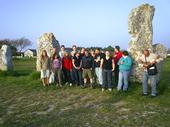Disclaimer: This is the MySpace site for the BSc (Hons) in Archaeology at Truro College (University of Plymouth & part of the Combined Universities of Cornwall project). It is run by the Programme Leader, Dr Caradoc Peters. It is not, however, the official site for the course (see below for the URL for the offical site), and any views expressed here are not those of Truro College, the University of Plymouth or the Combined Universities of Cornwall. Finally, I accept no responsibility for the content of sites linked to this one, as they are not under my control.
Our Strengths:If you are a real fan of archaeology, and would like to develop your understanding of the past in a small friendly group atmosphere, apply to us. The course will give a good grounding in British archaeology, with an appreciation of how this may vary at the local level, and the science behind archaeological analyses too
Very importantly with us, you will also gain a broad range of practical skills and experience. We do not just focus on excavation, but cover other forms of fieldwork, monument care and public archaeology, as well as museum and heritage work. This is because we believe in a realistic approach to what employers need. Practical has to include what to do with the archaeology after fieldwork, as many employers will tell you. Project and placement work will help you apply your skills to the work place. Our students inform us that the sheer number of fieldtrips and museum visits (including overseas) integrated into the course is the feature they enjoy the most.Why should I do Archaeology at Truro College?
Here are 6 good reasons:• Less formal approach to teaching
• Small class size groups, not large lecture halls full of students
• A great deal of contact time with the tutor
• Practical tuition through fieldtrips, museum trips and fieldwork
• Foreign archaeology trips
• Good contacts with local employers
About This Course: Cornwall is a fabulous area for exploring the past, particularly with its megalithic monuments, its castles (including that castle of legends, Tintagel) and its rich Industrial heritage. In fact, Cornwall’s Industrial remains now form a World Heritage site . Alongside all this archaeology, there is also the opportunity to take your university course in Archaeology in midst of these exciting prehistoric and historic landscapes. The course has excellent links to archaeological field units working in Cornwall, with students excavating alongside professional field archaeologists. We have a close association with museums in the South West such as the Royal Cornwall Museum , the National Maritime Museum in Cornwall and even the Royal Albert Museum in Exeter . We are also keen on heritage projects and work together with Cornwall's Historic Environment Service and the Cornwall Audio-Visual Archive (CAVA) to understand public attitudes concerning access to and conservation of monuments.
The FdSc takes 2 years to complete (full-time, or 4 years part-time) and the BSc (Hons) is an extra 3rd Year (2 years part-time) – both are validated by the University of Plymouth. We cover both prehistoric and historic archaeology, and even do a module on Cornish archaeology. With us, you will gain an understanding of the discipline of archaeology, combined with practical experience of field archaeology, museum work, and related heritage industries. There are plenty of local fieldtrips throughout the year, and visits to museums. We are located in the new purpose-built HE building. Aside from entering the workplace, you can also progress to a full combined honours degree either at Plymouth or here at Truro College to a full single honours Archaeology with a third year planned for 2007. As part of the course, we provide you with the opportunity each year to go on two overseas study trips and a conference trip within the UK*. This year (2006-7), these will be a field trip to Brittany, a museum trip to Athens (to see the Acropolis and Delphi) and a conference trip to York. Additionally, for those students interested in underwater archaeology, the College can arrange for additional courses leading to qualifications in diving and Nautical Archaeology. Of special interest here is the large numbers of historic shipwrecks off the Cornish coast, including the Scilly Isles.
As for cultural life, places such as the Hall for Cornwall, the Eden Project, and the open-air Minack Theatre are a must for concerts, plays and shows. As for lighter entertainment, there are also water sports such as surfing, sailing, wind-surfing, and scuba-diving (Cornwall is one of the world’s surfing hotspots attracting top-names), as well as the nightlife of clubs and pubs that cater for students. We & our College welcome people of all backgrounds: ethnic, religious and social. We welcome mature students, disabled students and part-time students as well as conventional students.
Course Details:The modules are:
Year One: • Archaeology & Environment from Prehistory to Roman Times • Excavation Principles & Design • History of Archaeological Thought • Post-Roman till Recent Times • Principles of Field Survey • Project Design • Work Based Learning • Research & Computer RequisitesYear Two: • The Archaeology and Geology of Cornwall • Museum Studies • Professional Archaeology • Quaternary and Archaeological Science • Survey & Excavation: Practical & Analysis • Project Report
Year Three: • World Archaeology • Archaeology, Science & the Popular Media • In Depth Period Study • Current Debates in Archaeology • Environmental & Conservation Archaeology • Dissertation Report
Please visit our official website: www.trurocollege.ac.uk/archaeology/
*Additional fees are charged for the optional trips
since December 2006
Distribution of my last 100 Visitors
Links created with the Social Bookmark Link Creator
